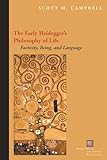The Early Heidegger's Philosophy of Life : Facticity, Being, and Language / Scott M. Campbell.
Material type: TextSeries: Perspectives in Continental PhilosophyPublisher: New York, NY : Fordham University Press, [2022]Copyright date: ©2013Description: 1 online resource (288 p.)Content type:
TextSeries: Perspectives in Continental PhilosophyPublisher: New York, NY : Fordham University Press, [2022]Copyright date: ©2013Description: 1 online resource (288 p.)Content type: - 9780823242207
- 9780823292882
- online - DeGruyter
| Item type | Current library | Call number | URL | Status | Notes | Barcode | |
|---|---|---|---|---|---|---|---|
 eBook
eBook
|
Biblioteca "Angelicum" Pont. Univ. S.Tommaso d'Aquino Nuvola online | online - DeGruyter (Browse shelf(Opens below)) | Online access | Not for loan (Accesso limitato) | Accesso per gli utenti autorizzati / Access for authorized users | (dgr)9780823292882 |
Frontmatter -- Contents -- Abbreviations -- Preface -- Acknowledgments -- Introduction -- PART I Philosophical Vitality (1919– 21) -- 1 Science and the Originality of Life -- 2 Christian Facticity -- PART II Factical Life (1921– 22) -- 3 Grasping Life as a Topic -- 4 Ruinance -- PART III The Hermeneutics of Facticity (1922– 23) -- 5 The Retrieval of History -- 6 Facticity and Ontology -- PART IV The Language of Life (1923– 25) -- 7 Factical Speaking -- 8 Rhetoric -- 9 Sophistry -- Conclusion -- Notes -- Glossary of Greek Terms and Expressions -- Bibliography -- Index
restricted access online access with authorization star
http://purl.org/coar/access_right/c_16ec
In his early lecture courses, Martin Heidegger exhibited an abiding interest in human life. He believed that human life has philosophical import while it is actually being lived; language has philosophical import while it is being spoken. In this book, Scott Campbell traces the development of Heidegger’s ideas about factical life through his interest in Greek thought and its concern with Being. He contends that Heidegger’s existential concerns about human life and his ontological concerns about the meaning of Being crystallize in the notion of Dasein as the Being of factical human life. Emphasizing the positive aspects of everydayness, Campbell explores the contexts of meaning embedded within life; the intensity of average, everyday life; the temporal immediacy of life in early Christianity; the hermeneutic pursuit of life’s self-alienation; factical spatiality; the temporalizing of history within life; the richness of the world; and the facticity of speaking in Plato and Aristotle. He shows how Heidegger presents a way of grasping human life as riddled with deception but also charged with meaning and open to revelation and insight.
Mode of access: Internet via World Wide Web.
In English.
Description based on online resource; title from PDF title page (publisher's Web site, viewed 03. Jan 2023)


